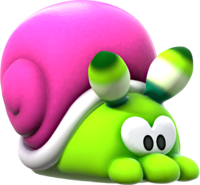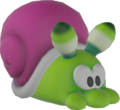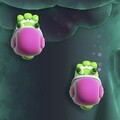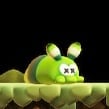Swirlypod: Difference between revisions
mNo edit summary Tag: Mobile edit |
m (→Trivia) Tag: Mobile edit |
||
| Line 36: | Line 36: | ||
==Trivia== | ==Trivia== | ||
*The Swirlypods' bulbous, striped | *The Swirlypods' bulbous, striped tentacles strongly resemble the {{wp|leucochloridium paradoxum|green-banded broodsac}}, a parasitic flatworm that infests the eyestalks of snails. | ||
==References== | ==References== | ||
Revision as of 11:06, January 30, 2024
| Swirlypod | |||
|---|---|---|---|
 Rendered game model of a Swirlypod | |||
| First appearance | Super Mario Bros. Wonder (2023) | ||
| |||
| |||
Swirlypods[1] are enemies from Super Mario Bros. Wonder that are introduced in the level Bulrush Coming Through!. They are green snails with a pink shell, and their name comes from "swirl", referring to their spiral shell, and "gastropod", a class of mollusks composed of snails and slugs. They move slowly on the ground, walls, and blocks, but some are also seen climbing up background walls of Semisolid Platforms. When stomped, they are launched out of their shells, much like Beach Koopas, and, after recovering from the dizziness, attempt to get back in it. When Swirlypods are eaten by Maw-Maws, their shells are spat out. Similar to Koopa Shells, their shell can then be picked up and used as a weapon or projectile against other enemies.
They are more prominent in Swamp Pipe Crawl, where the emerging pipes reveal they can withstand the poison without repercussion.
Big Swirlypods also appear in some levels with them with the same characteristics.
Gallery
Additional names
Internal names
| Game | File | Name | Meaning
|
|---|---|---|---|
| Super Mario Bros. Wonder | Snail | - |
Names in other languages
| Language | Name | Meaning | Notes |
|---|---|---|---|
| Japanese | マイマイ[2] Maimai |
Snail | |
| Italian | Kiocciola[3] | Pun on "chiocciola" (snail) |
Trivia
- The Swirlypods' bulbous, striped tentacles strongly resemble the green-banded broodsac, a parasitic flatworm that infests the eyestalks of snails.
References
- ^ Shea, Brian (October 19, 2023). Super Mario Bros. Wonder Flower Coins And Wonder Seeds Guide. Game Informer. Retrieved January 5, 2024. Trompette and Swirlypod verified via e-mail response from the author
- ^ 2023年12月28日発売! 圧巻の640ページに凝縮された「スーパーマリオブラザーズ ワンダー 完全攻略本」 – Nintendo DREAM WEB. Nintendo DREAM WEB. Retrieved December 26, 2023.
- ^ Swamp Pipe Crawl's Italian name: "Kiocciole sui tubi paludosi"




